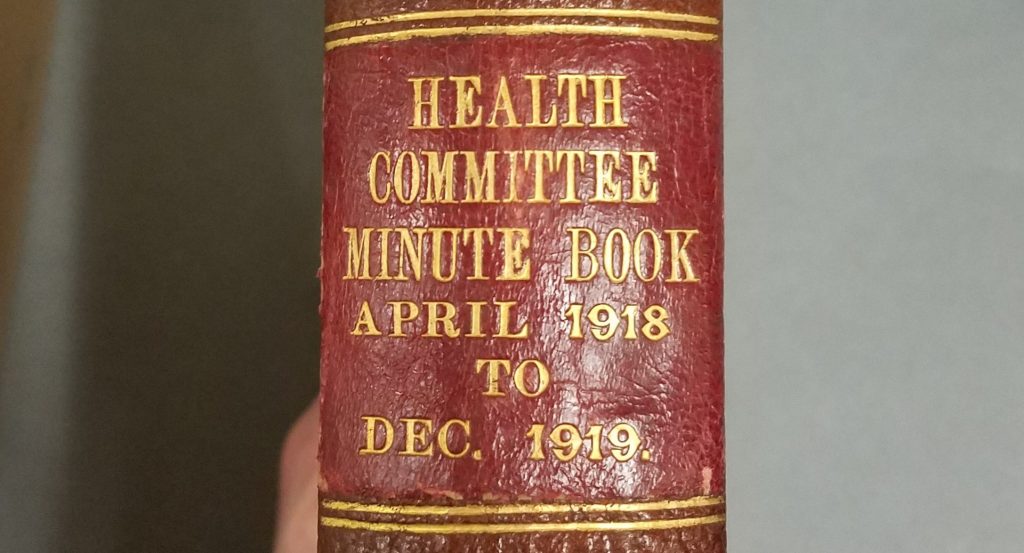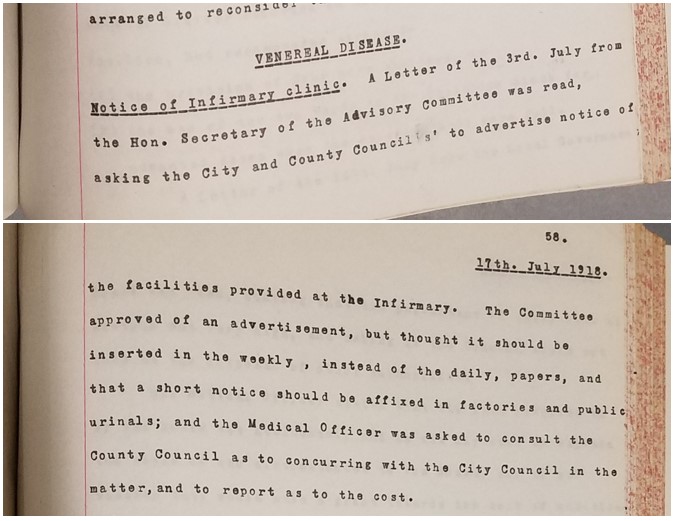World AIDS Day
- 1st December 2021
After providing an introduction to the Archive Service for a student, we were asked to raise awareness of World Aids Day, https://www.worldaidsday.org/ We were also asked about records covering sexual health, in order to advocate its importance amongst fellow students, particularly those who are LGBTQ+.
This got us thinking, since many records we hold are closed due to the sensitive personal information they contain. It can make researching such records tricky, but it is important to recognise closure periods are in place to protect the privacy of the people to which the information relates.
There is, however, the opportunity to apply to the depositor requesting access for academic research purposes. For instance, to South Worcestershire Primary Care Trust, to access specific records under 100 years which are closed under section 40 of the Freedom of Information Act (which applies to personal information as defined by the Data Protection Act). With permission from the depositor, academics may be able to use the records for research, with a guarantee of patient anonymity. Contact us for more information.

Ref 496.5 BA11241/E23/Box 2/2 Worcester Corporate Health Committee. 1918-1919.Typed minutes of the committee. These include the treatment of venereal diseases. Cover.
With the drive to end AIDS by 2030 and general awareness of sexual health amongst younger and older generations increasing, it is no surprise there is an interest in such records. Using search terms such as ‘medical’, ‘health’, ‘hospital’, ‘venereal disease’ or ‘sexual health’ in our Archive Catalogue will pick up medical records we hold. Please note, some closure periods on material has been retrospectively applied in the light of data protection and so some records may state they have ‘open’ access status, while we update the catalogue.
The main classes of medical records are:
010:6 Birmingham Regional Health Board
489:16 Hereford and Worcester Health Authority
499:8 Bromsgrove and Redditch District Health Authority
499:9 Worcester District Health Authority
499:10 Kidderminster and District Health Authority
589:6 Worcestershire Acute Hospitals NHS Trust
589:7 Worcestershire Mental Health Partnership NHS Trust
589:8 Worcestershire Health and Care NHS Trust
589:9 Worcestershire Health Authority
599:4 Worcestershire Health Trust
599:5 Worcester and District Community Health Council
599:6 Kidderminster and District Community Health Council
599:7 Bromsgrove and Redditch Community Health Council
599:8 South Worcestershire Primary Care Trust
899:1514 George Marshall Medical Museum
Lots of other records are deposited from private sources such as chemists shops or medical charities or will have come in as ‘artificial’ collections so they will have reference number 705 or 899. Medical records are also found in ecclesiastical deposits as the diocese used to license surgeons and midwives.
A large quantity of records are being catalogued as part of a project funded by the Wellcome Museum and the catalogues will be made available as part of the project. Catalogues will be live but the records showing personal, or individual will not be available.

Worcestershire Archives supports the work of Archives and Records Association Diversity Allies.
Indeed, as part of research for this blog some interesting records were identified which show the progression of sexual health treatment. They covered venereal disease legislation and committee minutes, circulated material and acknowledgments, printed material, reports, patient case records and registers, as well as some statistical records. It is a shame we cannot show them off but either for data privacy reasons or due to the wishes of the depositors, closure periods and copyright mean it is not possible. We would not, of course want to break down any trust we have with our depositors.
However, it was interesting to get a sense from the records of the evolution of sexual health provision in Worcestershire. The Venereal Disease Act 1917 obliged councils to set up special treatment centres for free and confidential treatment of venereal diseases (VD). Minutes from 1918 (below) show decisions made to advertise the service.

Ref 496.5 BA11241/E23/Box 2/2 Worcester Corporate Health Committee. 1918-1919.Typed minutes of the committee. These include the treatment of venereal diseases.
The original VD clinic at Worcester Royal Infirmary was at the end of the outpatients department, until recently a clinic named after John Edward Anthony was on Newtown Road. Now, a high-tech clinic resides in Worcestershire Royal Hospital.
Some may feel great progress has been made in terms of general awareness and removal of stigma attached to sexual health and more specifically with addressing the stigma attached to having AIDS or LGBTQ+ people. Talking with our new customer, this is their specific interest, and we were asked to help communicate a sense of progress by ‘sharing archaisms and words that were used regularly, but now are considered rude’. Well, somehow it doesn’t feel right to share those words on social media but here is an illustration showing anagrams of those words… so you need to get your thinking caps on! For hints see TNA LGBT+ History :

Anagrams of Historical LGBTQ+ Terms
In addition to looking at our original archives, a little look into the key dates relating to AIDS in the UK got us thinking whether there would be something mentioned in local newspapers we hold on microfilm. Well, a quick spot-check of early 1986 and late 1987 didn’t show anything. Perhaps this is something for a researcher to look into a little further. Do let us know if you find anything by posting a comments card in our new ‘Diverse Histories’ post box in the self-service area!
We are very aware there are certain records we have less of in the archives. Records of unrepresented groups such as LGBTQ+ are amongst them. To address this, we aim to take in records showing lives of such communities. By depositing records into the archives, you can ensure you are represented. It would be wonderful to receive deposits. Perhaps you have photos, leaflets or meetings notes showing how you are supporting World Aids Day? We would love this material in the archive, for future researchers to use. Please Contact us for more information.
Post a Comment